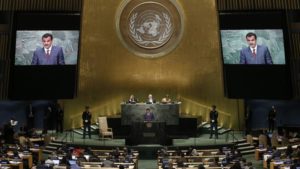by David Tolbert*
An independent mechanism established by the UNGA is working towards abolishing the reign of criminal impunity in Syria.

The Emir of Qatar, the country that led the efforts to establish the Mechanism alongside Liechtenstein, addressed the UNGA in September 2016 ©Reuters
Six years into the carnage in Syria, atrocious crimes run rampant, with savage abuses committed against all groups in the devastated country, and the murderous regime, abetted by powerful allies, is still in power.
The United Nations Security Council remains in a deadlock and unable to take any steps towards ensuring accountability for the massive crimes, with the International Criminal Court left on the sidelines.
However, amid the terrible loss of life, hope that the slow wheels of justice will finally be put in motion emerged recently from an unlikely source - the UN General Assembly.
In December 2016, the UNGA, led by Liechtenstein and Qatar, established an “Independent Mechanism to assist in the investigation of serious crimes committed in Syria since March 2011”.
With this step the UNGA, usually associated with administrative and budgetary matters, has asserted itself in a highly welcome if unusual manner, signaling the deep frustration with the failure of other UN organs and the great powers to stop the killing in Syria.
The move also demonstrates that small states can galvanise the international community around issues of global significance and catalyse a collective response.
The term “Mechanism” indicates that the powers of this newly established body will not mirror those of a court or a commission of inquiry.
Instead, the focus of its mission will be to collect and analyse evidence, which could then be available for courts or tribunals in the future to prosecute these massive crimes.
The material collected could also well be of use for other transitional justice processes, including truth commissions, reparations programmes and vetting processes.
If successful, this effort may truly be a breakthrough against the reign of impunity for the horrendous crimes committed in Syria. To be successful, however, the Mechanism’s work must be planned carefully rather than replicate the work of others.
Understanding and analysing evidence
My decade-long experience of working on four international tribunals tells me that the Mechanism should not primarily focus on collecting evidence in the first stage of its work.
Much of the same ground has already been covered by the courageous and very active Syrian civil society groups working in circumstances of great peril, as well as their international partners and the Commission of Inquiry established by the UN Human Rights Council, which has interviewed 1,400 witnesses.
Instead, the first step should be to understand and analyse the evidence that has already been gathered.
Surely, the investigations should concentrate on the most serious perpetrators and the most egregious crimes.
This approach was learned the hard way in the former Yugoslavia and other places of mass atrocities: with thousands of perpetrators, prosecutions are most effective when they focus on the political and military leaders, not foot soldiers.
Experience, including in cases against Slobodan Milosevic and Radovan Karadzic, has shown that properly analysing the evidence, and making the key connections between senior leaders and lower-level perpetrators is critical to demonstrating the criminal liability of those most responsible for planning and ordering atrocities.
This methodology, utilised in holding Karadzic responsible for genocide in Srebrenica, was also critical for holding Kang Kek Iew, the commander of the notorious S-21 prison camp in Cambodia - where all but seven of some 14,000 inmates perished - responsible for crimes against humanity.
Protecting witnesses
Another critical issue is witness protection. I have had the heavy responsibility of ensuring the protection of witnesses at several international courts, and consider this not only essential to successful investigations and criminal trials, but also a profound moral duty to those who put themselves in harm’s way for the cause of justice.
Because each contact with a witness places him or her in greater danger, understanding the evidence that is on hand prevents unnecessary contact with witnesses that may put them at risk - and ensures that resources are used wisely.
For this and other reasons, the Mechanism needs to engage - in its earliest days of operation - with the extraordinarily committed civil society groups in Syria and the Syrian diaspora, many of whom have felt left out of the process so far.
This can be remedied by the new body’s leadership engaging in consultations with such civil society groups that will go beyond perfunctory outreach efforts.
In very important ways, they are the constituency of this effort to obtain justice for mass atrocities in Syria, and the Mechanism’s leadership needs to understand this from the outset.
A path towards accountability
Finally, the choice of the leadership of the Mechanism is critical; indeed, it may well make or break the endeavour.
There are a number of relevant experiences to draw from in this regard, and they all point to the critical need to select women and men for leadership positions who have political and diplomatic acumen, and an understanding of how to manage an office focused on investigations in a very difficult terrain.
Most importantly, they need good judgment and strong nerves as they will face enormous challenges that exceed those that I experienced in the former Yugoslavia, Cambodia and Lebanon.
The UNGA’s Mechanism is an important innovation in the fight against impunity and potentially a crucial breakthrough for the victims in Syria.
It also has the potential to create a new path towards accountability at a time when justice seems to be on the margins of great powers’ agendas.
Its success will depend on how well it adopts lessons learned from other experiences, but also on the strong support of all of us committed to justice for the atrocities committed in Syria, whomever the perpetrators.
*This article was originally published here.
